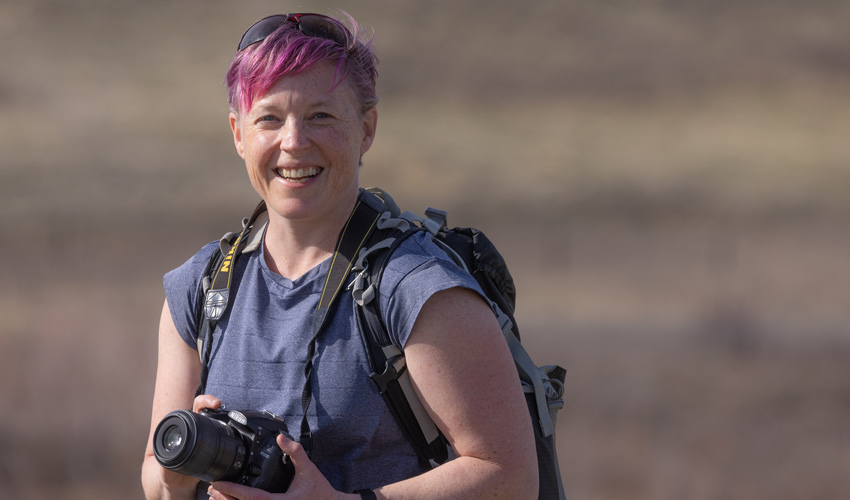MRU science communicator Dr. Sarah Hewitt receives 3M National Teaching Fellowship
Award honors exceptional contributions to teaching and learning
— Mount Royal University | Posted: May 1, 2023

Dr. Sarah Hewitt, PhD, has been chosen as one of ten recipients from across Canada to receive the 2023 3M National Teaching Fellowship Award. Photo courtesy Jon Groves.
A self-described “adventure scientist” who urges students to be bold, creative and take chances, Dr. Sarah Hewitt, PhD, has been chosen as one of ten recipients from across Canada to receive the 2023 3M National Teaching Fellowship Award.
Hewitt, an associate professor in the Department of Biology at Mount Royal, is known for innovative course designs that broadly advance teaching and learning. Through her novel science communication work, she dedicates herself to sharing and disseminating knowledge for the benefit of the academic community and helping students communicate science with a creative flair. By mentoring and partnerships with colleagues and students, she demonstrates her commitment to helping others amplify their voice and their practice.
“I try to communicate to students the value in relaxing into your education and that finding your inner curiosity will allow you to see the connections between ideas and help you let go of the need to memorize and have a definitive answer,” Hewitt says.
“Be bold. Take chances. Try something new. That’s how learning takes place.”
Consistently crafting the teaching and learning practice
The 3M National Teaching Fellowship is sponsored by both 3M Canada and the Society for Teaching and Learning in Higher Education (STLHE). Founded in 1986, the Fellowship honors exceptional contributions to teaching and learning at the post-secondary level.
Hewitt creates unique classroom experiences that encourage students to take risks in a supportive, yet challenging environment, and researches her pedagogy through extensive involvement in the scholarship of teaching and learning. She gives workshops across the country and internationally on teaching practices and developing science communication skills. While contributing to the transformation of teaching science, including breaking down disciplinary boundaries, Hewitt has, all the while, maintained an exceptional level of quality and excellence in her own classrooms.
“Innovative teaching is at the core of the exemplary undergraduate experience Mount Royal University is known for,” says Dr. Chad London, PhD, provost and vice-president, academic, at MRU. “Dr. Hewitt represents excellence in teaching and learning and Mount Royal congratulates her on this award.”
Hewitt’s work has been recognized through TransCanada Scholarship of Teaching and Learning grants, Mount Royal’s Distinguished Faculty Award and the Confederation of Alberta Faculty Associations’ Distinguished Teaching Award.
“Dr. Hewitt has a record in educational leadership, undergraduate teaching and educational innovation that embodies excellence,” says Dr. Jonathan Withey, DPhil, dean of the Faculty of Science and Technology at MRU.
“As I reflect on Dr. Hewitt’s achievements over the past 15 years, I am struck by her dedication to advancing teaching and learning across courses, disciplines and programs, her commitment to helping other educators strengthen their practices, her ability to lead and partner with colleagues and students, and her commitment to sharing and disseminating knowledge for the broader benefit of the academic community.”
Hewitt received her PhD in neuroscience in Dr. Jaideep Bains' lab at the Hotchkiss Brain Institute at the University of Calgary. She teaches neuroscience as well as physiology at MRU. She pursues her interest in science communication by travelling with researchers from a variety of disciplines and producing stories from the field. Through photography, audio and written content, she hopes to answer the important questions: “What is the research about? Why is this work important? Who are the scientists who devote their lives to this work? And what drives them?”
Her work has appeared in Discover Magazine, BBC, Scientific American, Canadian Geographic, Explore Magazine and more.
Hewitt brings that storytelling approach to her teaching as well, having students practise skills in creative science communication by producing science magazines as a class.
Canada now has more than 350 3M National Teaching Fellows, an award that has been likened to the Stanley Cup of university teaching, representing a broad range of academic disciplines from more than 80 small and large Canadian post-secondary institutions. After joining, Fellows continue to elevate teaching and learning at their own institutions and through larger, collaborative initiatives supported by 3M Canada, the STLHE and the Council of 3M Fellows, a constituent group within STLHE.
“Dr. Hewitt helped me fall in love with scientific research. She also inadvertently paved the way for me into a graduate program,” says Anthony Marullo, a Bachelor of Science — Biology (2020) alumnus, a former student of Hewitt’s and a current PhD candidate at the University of Cork, Ireland.
“The small class sizes at MRU fit perfectly with her desire to make each lesson a personal and unique experience.”
Another former student, Valerie Cates, credits Hewitt for inspiring her to pursue science communication, initially by encouraging her to incorporate some of her watercolour painting into a research project.
“Dr. Hewitt’s kindness and flexibility allowed me to see career options I had never even known about,” Cates says.
“I can unequivocally say that Dr. Hewitt is a true role model for her students. Without her help, I may have never realized how beneficial art is to science. Her creativity in class, flexibility in communication and love for both her students and her work are paramount to her impact on us as students.”
This year’s honourees were recently unveiled in Maclean's magazine. Hewitt joins Dr. Brett McCollum, PhD, (2019) and Dr. Pamini Thangarajah, PhD, (2022) as the only MRU faculty to receive the award.
Students in MRU’s Bachelor of Science — Biology major enhance their learning through hands-on, practical learning experiences and enjoy the flexibility of specializing further by completing concentrations in cellular and molecular biology, anatomy and physiology or ecology and evolution.

